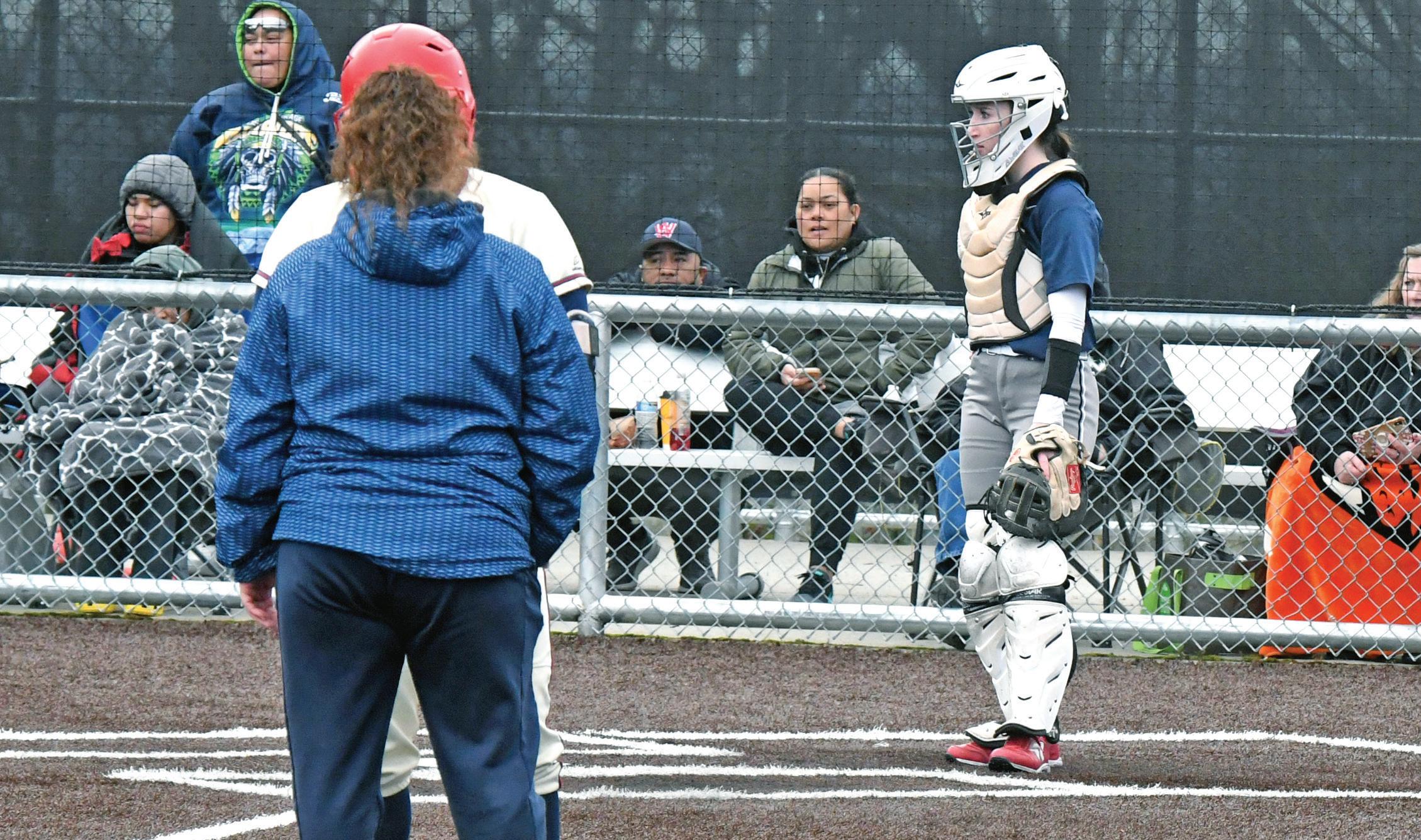
10 minute read
ALL SPORTS
Umpires are judged by their ability to call balls and strikes. Establishing and maintaining a consistent strike zone is a key for Jim Hochstrasser, Tooele, Utah.
INSISTENCE ON CONSISTENCY
Calling Them the Same Is the Elusive Goal
Be consistent.
If you’ve officiated for any length of time, you’ve likely heard that comment on numerous occasions.
It means different things to different people. If the comment comes from a coach it means, “I don’t want them called the same way for both teams; I want them called my way all the time.”
If an assigner, coordinator or assessor talks about consistency, it’s often part of a discussion about a point of emphasis or a rule interpretation. Consistency also matters when it comes to issues like working well with your partner or crew, adhering to policies established by your association or conference, or even interacting with players and coaches.
Consistency is the foundation of an official’s credibility. But because officials see the game differently from coaches and spectators, our definition of consistency differs as well. Some would argue true consistency means calling the same action the same way regardless of where or when it occurs or any other circumstances.
Yet consistency is something that’s virtually impossible to measure. The coach who hollers, “We’ve got eight fouls and they’ve only got two,” conveniently overlooks the fact his opponent is playing a passive zone defense while his own team is playing a pressing man-to-man. If several penalty flags fly in a short stretch of plays, a football coach will whine, “C’mon! Let ’em play!” But if a hand is laid on his quarterback a nanosecond after he’s released a pass,
the complaint will shift to, “Where’s the flag?”
In short, statistics pertaining to fouls called, flags thrown, yardage penalized, etc., whatever the sport, may be useful to an assessor or assigner, but are not indicative of an official or a crew’s level of consistency. Skilled teams will require less officiating than poor ones and officials do not always draw the cream of the crop. Experienced officials also know abandoning a certain amount of consistency in blowout games — passing on minor, non-safety-related violations committed by the trailing team, for instance — is not only acceptable but appreciated.
Competence vs. consistency
Consistency by itself does not equal competence. To be effective, an official must be capable of something called competent consistency. An umpire who calls the pitch at the ankles a strike all day, or an assistant referee who continually misapplies the Law on offside, may be consistent, by dictionary definition. But in instances like those, consistency does not equal competence.
Consistency, within a single game, or game-to-game, is related to the ability to concentrate on the task at hand. That can be difficult for officials working rec league, high school or even small-college games, who more often than not must deal with job and/or family responsibilities on game day before turning their attention to officiating.
Officials working at amateur levels often find themselves jumping from one level to another, perhaps handling a contest involving 13-yearolds one day and high school athletes the next.
The official may have to adapt to a different level of play, variations in the rules or wide variations in ability among players in the same game. All those factors can make achieving consistency more difficult.
As vital as it is for officials to maintain a consistent set of standards from one call to the next, it’s just as important to establish consistency among members of a crew, whether that crew has been together for 10 games or 10 years.
If one official is quick with the whistle and his or her partner or partners have a “let them play” approach, players and coaches can become frustrated. Nothing will drive a coach to distraction quicker than a situation where one official is calling things significantly different from another.
The best way to prevent that type of situation from dragging down your game is to conduct a thorough pregame conference.
It’s important for any official on any level to maintain focus on the game. The atmosphere in which the contest is played can make that task more daunting however, particularly if one or both coaches is barking at you.
The ability to handle complaints from coaches and others involved in the game while still being able to maintain a high level of consistency is what differentiates extraordinary officials from merely capable ones. When the temperature of a game starts to rise, it’s important for officials to retain confidence in their own ability.
It would be difficult if not impossible to teach consistency, but it can be learned. As officials gain experience, they learn what calls (and no-calls) are appropriate to the level they’re working. Reviewing games via video is one way officials can self-evaluate the consistency of their work.
As you watch, ask yourself, “What are you looking for? What angle are you trying to achieve? Are you in the right position?” While few plays or situations are exactly the same, the official can get a general idea of his or her consistency in movement, distance from plays and angles.
The question of whether consistency is a natural attribute or a skill acquired over time may never be completely answered. But maintaining your consistency will improve your game at whatever level you work. Adapted from a feature that appeared in the 6/10 issue of Referee. *


SURVEY SAYS …
RefReps and the Indiana High School Athletic Association conducted a poll the week of May 9 to find out how many interscholastic baseball and softball games had been canceled due to no umpires or officiated by one umpire during that point of the spring season.
359
Baseball games canceled due to lack of umpires
89
Softball games canceled due to lack of umpires
880
Baseball and softball games officiated by one umpire
QUICKTIP
When the game ends, walk with your partner(s) off the
court or field. With at least two of you together, you can look out for each other and for potential problems. Emotions often escalate after games and occasionally people will try to confront you. With two or more of you together, you have a potential peacemaker and a potential witness if anything should go awry. Always walk from the locker room to your cars as well. If riding separately, be sure everyone’s car starts; don’t leave a crewmate stranded.
THEY SAID IT
“My intensity was probably just off the charts. And really that’s probably why other people say I was great. I was a good umpire, and I enjoyed being on the field. It was really the only place I really ever felt comfortable. And that’s what I loved about the game.”
— Retired MLB umpire Jerry Crawford Jerry Crawford
They’re There to Aid Their ‘Crewmates’
You’ve heard it said often: The only allies we have are our partners or crewmates. While that is a uniting, even somewhat poetic, notion, it isn’t always true. There are other “crewmates” on the sidelines and in the press box who not only make our jobs easier, but can offer genuine help. All we need to do is recognize it.
Some of those potential helpers are of an official nature; others are not. But in a pinch they can all be counted upon.
We are all aware of the jobs of timers, scorers and chain crews. The question is: Are they aware of our expectations of them? Are you under-utilizing some of the resources at your disposal? The key is a good, clear pregame discussion with them.
Every official has taken the field or court only to quickly encounter a clock operator, chain crew or the like who tells them, “I’ve been doing this 10 (or 15 or 20) years. I know what I’m doing.”
New officials are often muted by such a statement. That’s a mistake. It is as important for you to go over their duties with them as it is to go over your own duties with your partners before a game.
If you’re met with a close-ended statement like that, try disarming them with a response like, “I really appreciate experienced help. Just so I’m on the same page, let’s cover some situations.” You’ve acknowledged their experience and led them to a place where they won’t be “insulted” by instructions.
On the other hand, you may encounter a “rookie,” especially at the sub-varsity level. “I’ve never done this before,” and “I don’t really know what I’m doing,” are not declarations you want to hear when you take the field or court. When you face that situation, it’s important to realize a big part of your job is going to involve multiple explanations and a slower pace to make things go right.
Don’t show irritation or impatience. That won’t help anything. Instead, anticipate less-experienced help at sub-varsity levels, and make it your habit to arrive at the game site even earlier than usual on those days for an extended pregame with your helpers. In fact, many officials have found those newbies to be superior to the “been here, done that” crowd because they are more accepting of your direction.
Often those “extra” members of your crew can provide valuable help, even a spare set of eyes, during tricky situations. For example, the down box operator on your chain crew can let you know there’s a flag you didn’t see on the far side of the field, or your scoreboard operator can advise you that there are subs waiting to come in. Take advantage of the help that’s available to you.
Even “unofficial” helpers can be useful. Those might include ball helpers and scorekeepers who have kept a close eye on the game. Take, for example, a baseball game in which there is a question about the count. You check with your partner, who has a different count than you. Now what? A quick stroll over to the official scorer will likely answer the question. Ask in a way that covers both of you, such as, “Do you show the count as 2-2 or 3-2?”
Be certain the person you ask for help is qualified to give it. Keeping your need for help on the “down low” in such situations is very important.
Sadly, there are times when your aides will be in over their heads or unwilling to cooperate. In those cases, find the game manager and explain the need for competent help. With luck the replacement will be an improvement.
Good officials use every tool at their disposal to pull the game off without a hitch. Don’t overlook the fact that some might be living and breathing. *

Jeff Arredondo, Seal Beach, Calif., consults with table personnel before a game. Ensuring you and auxiliary helpers are on the same page is important to the smooth conduct of a contest.
‘There’s an Injured Player on the Field … ’
Player injuries are common in virtually every sport. There is a right way and a wrong way for officials to react to those incidents. The following is taken from Sports Officiating: A Legal Guide, written by attorney Alan Goldberger, an expert in laws that apply to sports officials.
•Determine if the player really is in need of assistance. If so, stop play and beckon the coach.
•Don’t attempt to treat the player yourself.
•Don’t discuss the cause of the injury with anyone.
•Do not request anyone to move the injured player so that you can get the game started again. It does not matter if the delay is one minute or four hours. Only the medical personnel, once you’ve called out the coach, can and should determine if the player can be moved and when.
•Keep opposing players on the field or court separated.
•Continue to supervise both teams, including bench areas.
•A player who is bleeding must be treated before resuming participation.
Each code has its own procedures to address players who are bleeding or whose uniforms are saturated with blood. Similarly, a player who is unconscious or is showing signs or symptoms of a concussion must be sent off the field or court. *
Hilary Crisman, Bellingham, Wash., checks on an injured player.











